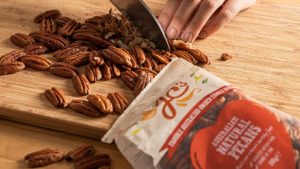How Fruits and Vegetables Serve as Nature's Multivitamin!
Scanning the chemist’s shelves filled with vitamin supplements might make you wonder if you’re getting enough nutrients.
The Australian complementary medicines sector was worth over five billion Australian dollars in 2021 (Statista Research Department, 2024). Are these fancy labels and bold claims fuelling the notion that we must rely on them to cure our nutritional deficiencies? Our research says otherwise! The saying ‘eat apple a day to keep the doctor away’ is actually true, well sort of! Keep reading.
The good news is that, according to Maureen Salamon from Harvard Women’s Health Watch, most supplements aren’t necessary. So maybe it’s time to think simpler by maximising the mix of foods on your plate.

In the world of nutrition, fruits and vegetables stand as vibrant health ambassadors, offering a bounty of essential vitamins and minerals to nourish the body. From the immune-boosting powers of vitamin C to the bone-strengthening benefits of calcium, these natural wonders hold the key to optimal well-being.
Vitamin C
Vitamin C, renowned for its immune-boosting properties and antioxidants, is abundant in citrus fruits such as oranges, lemons, and grapefruits. Additionally, berries like strawberries, raspberries, and blueberries, along with capsicum, broccoli, and kiwi, offer substantial doses of this essential vitamin.
Vitamin A
Vitamin A is critical for vision, immune function, and skin health. It is abundant in various fruits and vegetables. Orange and yellow produce like carrots, sweet potatoes, and pumpkin are rich sources of beta-carotene, a precursor to vitamin A. Leafy greens such as spinach and kale also offer ample amounts of this essential nutrient.
Vitamin E
Vitamin E is an essential nutrient with antioxidant properties that foods such as spinach, kale, avocado and broccoli offer significant amounts of. Additionally, fruits like kiwi, mango, and paw paw contain notable levels of vitamin E.
Iron
Iron is essential for oxygen transport and energy production and is prevalent in various plant-based foods. Leafy green vegetables such as spinach, kale, and swiss chard are excellent sources of iron. Get those greens in! According to Dietitians Australia, Iron is also present in dried apricots and prunes.
Magnesium
Magnesium is essential for numerous bodily functions and critical to overall well-being. Its importance cannot be overstated, from supporting nerve function and promoting muscle relaxation to fortifying bone health. A plethora of fruits and vegetables, including leafy greens like spinach and swiss chard, serve as rich sources of this vital mineral.
Calcium
Calcium is critical for bone health, muscle function, and nerve transmission and is abundant in numerous fruits and vegetables. While dairy products like milk and cheese are traditional sources of calcium, greens, particularly kale, broccoli, cabbage, and bok choy, are also calcium-rich choices!
Folate
Folate is a crucial B vitamin vital for cell growth and DNA repair. It is naturally present in a wide variety of foods, including leafy green vegetables like spinach, asparagus, and brussel sprouts. Greens really are a superfood!
Potassium
Potassium is vital for muscle and nerve function, fluid balance, heart health, and maintaining healthy blood pressure levels. Bananas are perhaps the most famous potassium-rich fruit, providing a significant portion of the recommended daily intake per serving. Tree fruits such as avocados, apples, oranges, and kiwifruit are also high in potassium. As for vegetables, the options are endless! Tomatoes, cucumbers, zucchini, eggplant, spinach, sweet potatoes, and pumpkin are all noteworthy sources of this essential mineral.
It’s hard to resist the appeal and ease of those colourful candy-like vitamin gummies, but when you’ve got a whole rainbow of fruits and veggies at your disposal jam-packed with almost all essential vitamins and minerals, who could pass that up? By eating a healthy and varied diet, you are giving your body a taste of it all. From iron to potassium, from spinach to oranges. Fruit and vegetables are superfoods in their own right.
The World Health Organisation states that people with diets rich in fruit and vegetables have a significantly lower risk of obesity, heart disease, stroke, diabetes, and certain types of cancer. Not only does eating well benefit physical health, but it can also help treat some of the symptoms of mild depression and anxiety and reduce the risk of developing them (Beyond Blue, 2022).
There is no arguing that fruits and vegetables are essential to a healthy diet, but a balanced diet is the key to overall health and well-being. The Australian Guide to Healthy Eating is a great resource for determining what other foods are essential to a healthy diet.
References:
Beyond Blue. (2022). Eating well and mental health. https://www.beyondblue.org.au/mental-health/eating-well
Salamon, M. (2022, June 1). The truth about nutrient deficiencies. Harvard Health. https://www.health.harvard.edu/nutrition/the-truth-about-nutrient-deficiencies
Statista Research Department. (2024, January 10). Vitamins, minerals, and supplements market in Australia. Statista. https://www.statista.com/topics/4869/herbal-medicine-and-functional-foods-market-in-australia/#topicOverview
World Health Organisation. (2024). Healthy diet. World Health Organization. https://www.who.int/initiatives/behealthy/healthy-diet#:~:text=A%20healthy%20diet%20is%20essential,are%20essential%20for%20healthy%20diet


